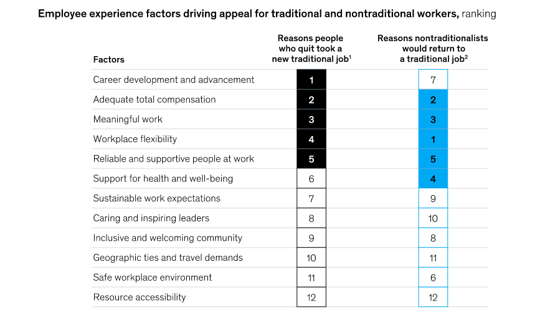Car retailers are among employers who must adopt a “multi-pronged” approach to attracting and retaining workforce talent as the post-COVID job sector reshuffle continues, according to research from McKinsey.
In its newly-published quarterly report into ‘The Great Attrition’ the global research and consultancy firm gave insight into reasons why traditional workers were exiting their industry and failing to return.
And it suggested that a variety of strategies might be required entice employees back to help alleviate current skills shortages.
“Competition for talent remains fierce”, said McKinsey. “At the current and projected pace of hiring, quitting, and job creation, openings likely won’t return to normal levels for some time.”
It added: “Employers continue to rely on traditional levers to attract and retain people, including compensation, titles, and advancement opportunities. Those factors are important, particularly for a large reservoir of workers we call “traditionalists.”
“However, the COVID-19 pandemic has led more and more people to revaluate what they want from a job—and from life—which is creating a large pool of active and potential workers who are shunning the traditionalist path.”
McKinsey’s data showed that 48% of the job leavers were heading to different employers in different industries, with some industries are disproportionately losing talent.
Retail workers were the most likely to leave their sector and not return, meanwhile, with 76% of leavers making a permanent exit between April 2021 and April 2022.
Many employees leaving traditional employment are either going to non-traditional work, including the GIG economy or part-time roles, while others had started their own businesses.
 But McKinsey identified a disparity between employees’ reasons for leaving and the levers it might take to attract them back into a traditional sector such as car retail.
But McKinsey identified a disparity between employees’ reasons for leaving and the levers it might take to attract them back into a traditional sector such as car retail.
While career advancement, salary and ‘meaningful work’ emerged as key reasons to leave a job, workplace flexibility and support of health and wellbeing rose up the list of priorities for those who might return.
Brayleys Cars is among a host of car retail groups that has revaluated its employee offering since the COVID-19 pandemic. AM recently reported that the group had appointed an independent whistleblower service to ensure employee concerns do not go unheard.
 Simon King, managing director of Autotech Recruit recently wrote in an AM opinion column, meanwhile, that the automotive sector needs to focus hard on its recruitment strategies to overcome staff shortages.
Simon King, managing director of Autotech Recruit recently wrote in an AM opinion column, meanwhile, that the automotive sector needs to focus hard on its recruitment strategies to overcome staff shortages.
In its report, McKinsey said: “No single solution is going to attract enough people to fill all the job openings and retain a productive workforce. Instead, employers can take a multipronged approach to reach different talent pools.
“This doesn’t mean that organizations have to change their mission, values, or purpose. Rather, they can showcase different facets of their employee value proposition to a broader number of workers and get more creative in their offers to current and potential employees.”
In his Budget statement the Chancellor of the Exchequer Jeremy Hunt revealed a handful of actions designed to ease the UK’s skills shortage, including “Returnships”, designed to re-train the over-50s and reintroduce them to the workplace.
Days before the Budget, UK vacancies data showed the number of jobs on offer between December and February fell by 51,000 compared with the three months before.
Despite the drop, the number of job vacancies remains high at 1.1 million.
There are also 328,000 more vacancies compared to the pre-pandemic period of between January and March 2020.
- SEO Powered Content & PR Distribution. Get Amplified Today.
- Platoblockchain. Web3 Metaverse Intelligence. Knowledge Amplified. Access Here.
- Source: https://www.am-online.com/news/people-news/2023/03/29/employers-need-multipronged-approach-to-attract-talent-into-the-workforce